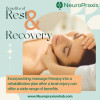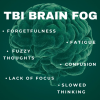
When it comes to recovering from a brain injury, traditional medical treatments are often the primary focus. However, integrating complementary therapies like massage into the rehabilitation process can provide a holistic approach to healing. Massage therapy has gained recognition as a valuable tool in aiding brain injury recovery, offering a range of benefits that contribute to physical, mental, and emotional well-being. In this article, we delve into the remarkable advantages of incorporating massage therapy into the rehabilitation journey after a brain injury.
Enhanced Blood Circulation
Massage therapy can significantly improve blood circulation, ensuring that essential nutrients and oxygen are efficiently delivered to brain cells. By increasing circulation, the brain’s healing process is expedited, promoting cellular regeneration and reducing the risk of secondary complications. Improved blood flow also aids in reducing swelling and inflammation, which are common challenges following a brain injury.
Stress Reduction and Relaxation
Brain injuries often lead to heightened stress levels, anxiety, and even depression. Massage therapy triggers the release of endorphins, the body’s natural “feel-good” hormones, promoting relaxation and reducing stress. This natural stress reduction can positively impact mood and emotional well-being, providing a sense of calm and comfort during the recovery process.
Pain Management
Post-brain injury pain can be debilitating and hinder the recovery process. Massage therapy helps alleviate pain by targeting tense muscles and releasing built-up tension. Through gentle manipulation, massage therapists can improve muscle flexibility and joint mobility, relieving discomfort and enhancing overall physical comfort.
Improved Range of Motion and Flexibility
Brain injuries can lead to muscle stiffness and reduced range of motion. Massage therapy techniques, such as stretching and kneading, can help improve flexibility by breaking down scar tissue and adhesions. This can lead to improved mobility and better overall functionality, enabling patients to engage in daily activities more effectively.
Enhanced Neurological Connections
Massage therapy stimulates sensory receptors in the skin and muscles, which can enhance neurological connections and facilitate brain-to-body communication. This can be particularly beneficial for patients recovering from brain injuries, as it may contribute to improved motor skills, coordination, and sensory perception.
Promotes Sleep Quality
Sleep is crucial for brain healing and overall recovery. Massage therapy has been shown to promote better sleep quality by reducing anxiety, alleviating pain, and inducing relaxation. Improved sleep patterns support the brain’s healing processes and aid in cognitive restoration.
Reduced Swelling and Edema
Brain injuries often result in cerebral edema (swelling), which can lead to increased intracranial pressure. Certain massage techniques, such as lymphatic drainage, can help reduce swelling by encouraging the removal of excess fluids and waste products from the body. This can contribute to a faster recovery and minimize the risk of complications.
Boosted Mood and Mental Clarity
Massage therapy’s positive impact on endorphin release and stress reduction directly influences mood and mental clarity. Patients often report feeling more focused, alert, and emotionally balanced after a massage session. This mental boost is essential for maintaining a positive attitude during the recovery process.
Conclusion
Incorporating massage therapy into the rehabilitation plan after a brain injury can offer a wide range of benefits, from enhanced blood circulation and stress reduction to improved pain management and neurological connections. As a complementary therapy, massage provides a holistic approach to recovery that addresses physical, mental, and emotional aspects of healing. By working in conjunction with traditional medical treatments, massage therapy can contribute significantly to a smoother and more comprehensive recovery journey for individuals healing from brain injuries. Always consult with medical professionals before starting any new therapies as part of your rehabilitation plan.


